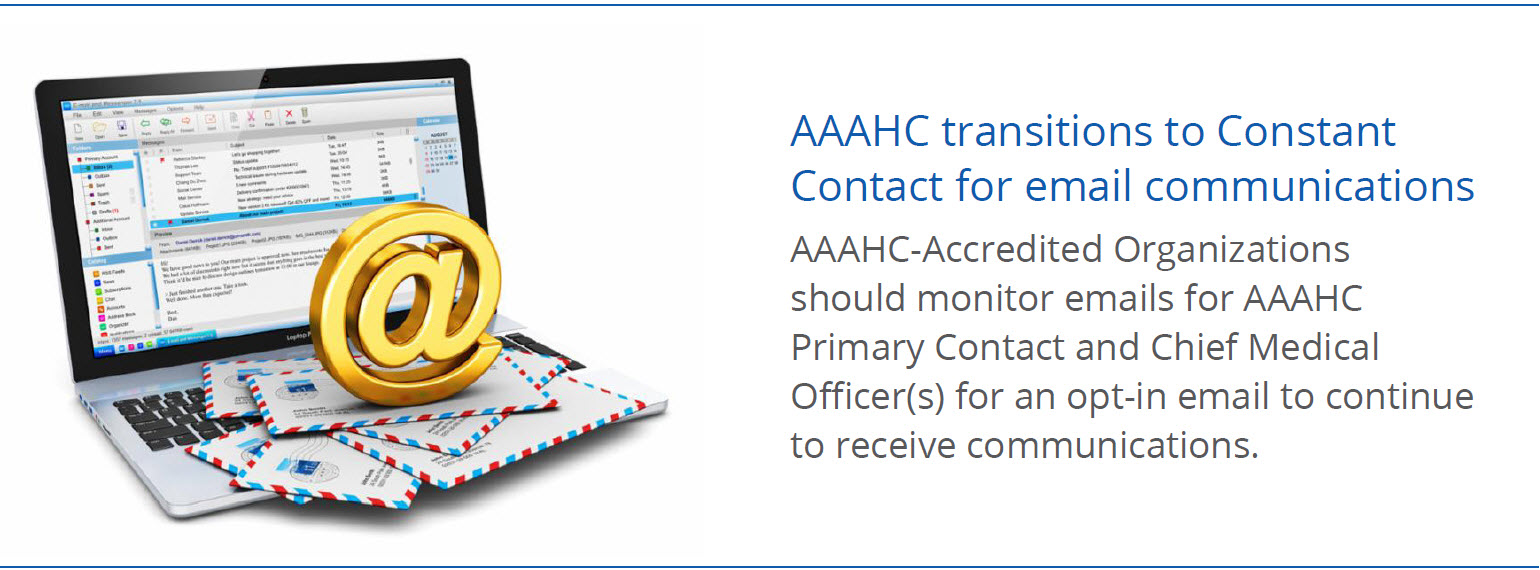Posted in: Triangle Times Today

Volume 3 | Issue 3 | Mar 2024
New Standards for Advanced
Orthopaedic Certification
AAAHC updated its v43 Advanced Orthopaedic Certification (AOC) Standards. The three-year specialty AOC program, originally launched in 2018, aligns seamlessly with the AAAHC Certificate of Accreditation for Ambulatory or Medicare Deemed Status program. The revisions are driven from top deficiencies, as well as valuable feedback from our Standards Development Committee, client organizations, Surveyors, and staff. The goal was to have an inclusive process of dialogue and consensus-building with stakeholders.
While accreditation demonstrates an organization-wide commitment to ongoing quality improvement, advanced certification is a specialty program that focuses on patient outcomes and is built on accreditation requirements. Compliance with the AAAHC Standards for Advanced Orthopaedic Certification demonstrates use of evidence-based clinical practice guidelines, ongoing performance improvement strategies, and infrastructure that promotes excellence. Through an onsite survey with a clinical surveyor experienced in the ambulatory orthopaedic setting, this program focuses on transitions of care from patient pre-assessment through discharge and rehabilitation.
Participation requires that the organization has AAAHC Accreditation in addition to:
- A dedicated core team of clinicians with education and expertise in orthopaedics
- Staff who have or are working toward orthopaedic certification credentials
- Performance measures that are collected and submitted to a nationally recognized specialty registry
The Advanced Orthopaedic Certification program assesses an organization’s use of evidence-based clinical practice guidelines, ongoing performance improvement strategies, and an organizational infrastructure that promotes excellence. Through an onsite survey conducted by clinical Surveyors experienced in the ambulatory orthopaedic setting, this program provides a comprehensive focus on transitions of care from pre-assessment through discharge and rehabilitation.
With an overarching goal of improving quality outcomes and patient care, the v43 Standards revisions are refined for ease of implementation. The updated AOC handbook adds guidance to support understanding of community needs assessment, clarifies on-call physician requirement, and provides examples of training hours.
Further enhancements include a crosswalk that offers a high-level overview of changes to the requirements to help users identify changes from the previous version.
Organizations interested in applying for the AOC program can start preparation by identifying core leaders who will manage the certification process. Core leaders will also act as resources to staff when training new competencies
and best practices, while directing education and consumer engagement activities. Next, develop a project plan which can also be used as the basis for your quality improvement plan for the orthopaedic program. Once the plan is developed, conduct a self-assessment to determine what is missing from your current processes, then document a plan of correction for any gaps in policy/process and performance. Finally, implement the actions needed to be in compliance with the AOC requirements.
The newly evolved handbook reflects AAAHC’s commitment to quality improvement and will be effective, concurrently, with the launch of 1095 Engage, the new accreditation management system. Regardless of expiration/anniversary date, all organizations are expected to be in compliance with v43 on April 3, 2024.
For more information about the v43 AOC program, watch the complimentary educational webinar, Your Successful Transition to AAAHC v43 Standards – Advanced Orthopaedics Certification Program, here.
Benchmarking Studies guide quality improvement
The AAAHC Institute for Quality Improvement offers Benchmarking Studies to help you conduct effective, data- driven improvement within your organization. Know where you stand relative to your peers. Identify performance goals and interventions for quality improvement by participating in benchmarking studies.
AAAHC Benchmarking Studies are open to any ambulatory health care center. The annual subscription rate provides access to participation in a maximum of four benchmarking studies per year (two per calendar year cycle).
The annual subscription model also allows subscribing organizations to access all study reports, regardless of participation, at the end of the study cycle.
Frequently Asked Questions: v43 Advanced Orthopaedics Certification
Who are Core Leaders and what is their role?
The Core Leaders are designated by the governing body and include a minimum of two individuals: a medical director and a clinical resource person. If the medical director is not an orthopaedic or neurosurgeon, then an orthopaedic or neurosurgeon must be appointed as a physician champion for the program and be part of the core team to ensure that specialty care is delivered according to the AAAHC Advanced Orthopaedic Certification (AOC) Standards.
The Core Leaders are involved in the development and review of specialty policies. They act as a resource for staff, providers, and patients. Additionally, they participate in the review of the specialty program, which extends to quality improvement activities and consumer and community engagement.
Does a specialty surgeon have to be listed on call 24/7?
Yes. A physician of the same orthopaedic specialty or within the AOC program is responsible for the emergency care of patients and is on call 24 hours a day, every day of the year.
How often should policies be reviewed?
The care of patients undergoing orthopaedic surgery can change or be modified based on current, available research. The expectation is that the organization will be cognizant of the changes in this field and how they apply to the services provided. This cannot be a predetermined number as research studies become available at different times. The Surveyor is expected to address this with the organization to determine the method or process used to ensure that the organization is aware of current best practices and how the organization has assimilated changes into their protocols.
What is a community needs assessment?
A community needs assessment is a process an organization uses to develop an understanding of the health needs of the surrounding community and defines how the organization’s services will address the needs of the patient population. This periodic assessment should be done to gauge whether the organization’s services meet a defined need and the community can accommodate the associated pre- and post-operative patient care needs. The assessment may include related population statistics, disease prevalence, surrounding provider services and proximity, strategic partnerships (e.g., referring providers, hospitals, rehabilitation facilities, and skilled nursing facilities).
What are methods of community engagement?
Community engagement starts with understanding the community, and this can be achieved through partnerships with community centers, outreach programs, or local activities set up by the organization. Activities may include:
- Publishing orthopaedic-related articles in newsletters, mailings, and newspapers
- Participating in health fairs
- Scheduling speaker forums, such as presentations at community centers, senior centers, school assemblies, church groups, and workplace sites
- Sponsoring events in the community that promote health and wellness related to
orthopaedic conditions.
Conferences & Exhibits
- Ambulatory Surgery Center Association (ASCA)
April 17–19, Orlando, FL, Booth 602 - American College Health Association (ACHA)
May 28–June 1, Atlanta, GA, Booth 600 - Florida Society of Ambulatory Surgical Centers (FSASC)
July 17–19, Orlando, FL - Texas Ambulatory Surgery Center Society (TASCS)
July 24–26, Galveston, TX - California Ambulatory Surgery
Association (CASA)
September 4–6, Anaheim, CA, Booth 37 - North Central College Health
Association (NCCHA)
October 23–25, St. Paul, MN - Becker’s Healthcare
October 30–November 2, Chicago, IL
1095 Learn
2024 Achieving Accreditation
- September 16–18 Virtual
- December 12–13 Onsite, Las Vegas, NV
To learn more, visit /v/MarAAnews




